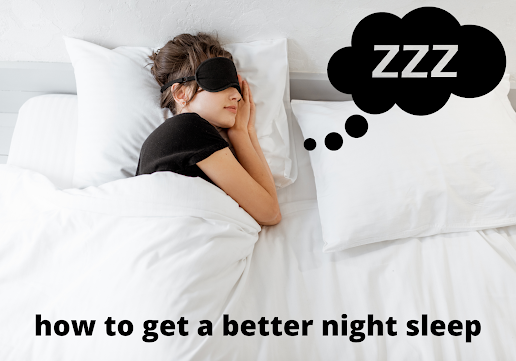Did you know that sleeping at least eight hours a night decreases the risks of obesity, cardiovascular disease, and type II diabetes? Good quality sleep is an essential component of your good health. Sadly, it’s also one of the last things most of us think about when trying to increase productivity. ▶ Check my recommended product [ how to get a better night sleep ]
However, just like eating right, staying hydrated, and exercising moderately, getting a better night’s sleep should be one of the first improvements you make to create a healthy and productive lifestyle for yourself.
Here are some tips and tricks for getting a better night's sleep:
Establish a bedtime routine:
Having a consistent bedtime routine can help signal to your body that it's time to wind down and prepare for sleep. This can include activities like reading a book, taking a warm bath, or practising relaxation techniques like deep breathing or meditation.
Create a sleep-friendly environment:
The environment in which you sleep can have a big impact on your sleep quality. Make sure your bedroom is cool, dark, and quiet, and invest in a comfortable mattress and pillows.
Avoid screens before bedtime:
The blue light emitted by screens (such as phones, tablets, and TVs) can disrupt the production of the sleep hormone melatonin and make it harder to fall asleep. Try to avoid screens for at least an hour before bedtime.
Exercise regularly:
Regular physical activity can help improve sleep quality, but it's important to avoid vigorous exercise too close to bedtime, as it can actually have the opposite effect.
Avoid caffeine and alcohol before bedtime:
Both caffeine and alcohol can interfere with sleep, so it's best to avoid consuming them for at least a few hours before bedtime.
Practice relaxation techniques:
Techniques like deep breathing, progressive muscle relaxation, and meditation can help calm the mind and body and prepare you for sleep.
Get exposure to natural light during the day:
Natural light can help regulate your body's sleep-wake cycle, so try to get some exposure to sunlight during the day.
Don't lie awake in bed:
If you can't fall asleep within 20–30 minutes, get out of bed and do a relaxing activity until you feel tired again. Lying awake in bed can actually make it harder to fall asleep.
I hope these tips and tricks are helpful in improving your sleep quality. If you are still struggling with sleep despite trying these strategies, it may be a good idea to consult a healthcare professional for further evaluation and treatment.



2 Comments
Extremely useful information which you have shared here about foam mattress. This is a great way to enhance knowledge for us, and also beneficial for us. Thank you for sharing an article like this. Hybrid Foam Mattress
ReplyDeleteThanks for publishing such excellent knowledge. You are doing such a good job. This info is very helpful for everyone. Keep it up. Thanks. Read more info about best firm mattress uk
ReplyDeleteThanks for your comment. Have a nice day😋
Emoji